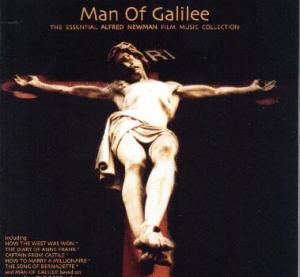A worthwhile, entertaining compilation taken from the works of celebrated film composer Alfred Newman, performed by The City of Prague Philharmonic Orchestra and Crouch End Festival Chorus.
Opening with the instantly recognisable ‘20th Century Fox Fanfare’, this illustrates perfectly how Newman’s music has become an intrinsic part of our cinematic consciousness, his work now forever linked with the sights and sounds of the movie memories we all share. He is one of the cornerstones of American film music, and time and time again this CD proves how important he has been in forming the Hollywood ‘sound’ of twentieth century cinema. Take for instance his ‘Street Scene’ from How to Marry a Millionaire (1953), a bluesy, brassy, archetypal piece that almost defies analysis. It simply is film music. Of course that’s not to say that every selection is beyond criticism. The suite representing The Diary of Anne Frank (1959) for instance has an ‘Overture’ that is overly schmaltzy considering the grave subject matter.
Elsewhere, the ‘Overture’ from The Mark of Zorro (1940) is very much old-school film scoring, all broad strokes and rather simple-minded, but for nostalgics a real treat. Very different in tone are both the grand, imposing ‘Main Theme’ from Anastasia (1956), a romantic, yet slightly tragic motif and The Song of Bernadette (1943) with a lyrical ‘Overture’ that has a sense of spiritualism and wonder. Concluding disc 1is a suite from How the West Was Won (1962) and it’s here that Newman’s undeniable talent really shines through. ‘Prelude/The Land’ is a big, bold, true ‘western’ theme that is very evocative and not a little stirring, skilfully creating a sense of the great outdoors and the people who inhabited it. ‘Cheyenne Attack and Aftermath/Finale’ opens with a military air, leading into ominous drums and staccato bursts of brass signalling assault and combat, with a brief reprise of the ‘Prelude’ theme to signify heroism under fire. Finally there is time to consider the cost of battle as the music grows increasingly plaintive and then reflective and hopeful. Lastly and best of all to my mind is a lavish, sparkling choral version of the main ‘Prelude’ theme on the titular ‘How the West Was Won’. Terrific stuff!
Overall, Disc 2 is less compelling with the ponderous ‘Overture’ from The Keys of the Kingdom (1944) and the standard (sub-par Bernsteinesque) western music of the ‘Main Title’ from Nevada Smith (1966) not really making much of an impression. The regal ‘Conquest’ from Captain From Castile (1947) is admittedly better, but a suite from The Razor’s Edge (1946) really raises the bar. Its ‘Main Title’ has a melancholic, poignant theme that is developed through the cue ‘Seduction’ in a subtle, restrained version that reminded me just fleetingly of Herrmann’s truly wonderful The Ghost and Mrs Muir (1947) (something in the string arrangement perhaps). Sadly though the quality drops away again with ‘Cathy’s Theme’ from Wuthering Heights (1939), a syrupy piece that to my mind hasn’t dated particularly well (a contentious opinion perhaps!?).
Lastly and most welcome of all is ‘Man of Galilee’, a symphonic Cantata for Contralto, Baritone, large choir and orchestra, drawn from the film scores of The Robe (1953) and The Greatest Story Ever Told (1965). Adapted and with original lyrics by Ken Darby, the ‘Prologue’ (featured in The Robe ) is a brisk, sprightly opening, but the true highlight is ‘The Promise of the Holy Spirit’ (The Robe again), beginning with a hesitant brass fanfare that leads into a wistful, rather lovely theme that is one of Newman’s finest. The latter section, as choir takes over the melody, is really wonderful. Continuing with material taken from The Robe, ‘Rejoice’ showcases more extensive choral work in a fervent celebration of Christ’s time on earth and it’s not until ‘The Great Journey’ that music derived from The Greatest Story Ever Told appears, with an emotional theme full of nobility and glory (although the upbeat, hopeful finale is once again from The Robe). The least successful element of the Cantata as a whole is ‘Miriam’s Song’ (The Robe), a lyrically awkward invocation of Christ’s resurrection. Fortunately, ‘Sunrise of the Third Day’ (originally written for The Greatest Story Ever Told but replaced in the film by the ‘Hallelujah Chorus’ from Handel’s ‘Messiah’) is a fitting conclusion. This would have undoubtedly had great impact in the film itself and it’s a crime that we were robbed of what would have been a very powerful sequence, as the music soars toward ultimate triumph and fulfilment. My only reservation concerning ‘Man of Galilee’ as a whole would be the more overtly operatic sections, as they often veer into uncomfortable melodrama. Even so, a tremendous achievement with the highs lofty indeed.
Conducted by the experienced Nic Raine and Paul Bateman (with Kenneth Alwyn on Wuthering Heights), there is a mixture of styles on offer here with some strong individual cues (How the West was Won and parts of ‘Man of Galilee’ in particular). A very valid collection and something that any serious film music admirer should acquaint themselves with at the earliest opportunity.
Mark Hockley

